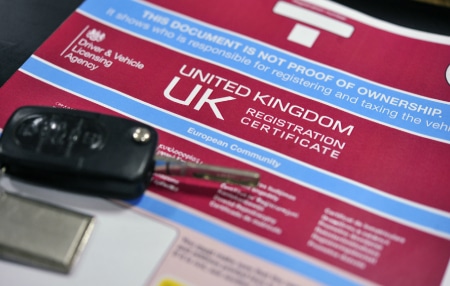
For information on how to manage your debt and to access free debt advice, visit www.moneyhelper.org.uk. You can also discover more about your options when it comes to paying off your debt.
What is a logbook loan?
Logbook loans are secured by using your vehicle as collateral, which means the lender retains ownership of your car until the loan is fully repaid. Eligibility for a logbook loan typically requires the borrower to be the legal owner of the vehicle, with no outstanding finance.
During the application process, lenders conduct affordability checks to see whether borrowers have the financial capacity to meet the repayment terms.
The amount that can be borrowed is directly related to the value of the vehicle used as collateral. The value is assessed by the lender, considering factors like the car’s make, model, age, condition, and mileage.
Borrowers should be cautious, as the Annual Percentage Rate (APR) for logbook loans can be as high as 400%, making them an expensive borrowing option. Additionally, if repayments aren’t made on time, the lender has the right to repossess and sell the vehicle to cover the debt.
How do logbook loans work?
When you secure a logbook loan, two separate agreements are used, which include a loan agreement and a bill of sale agreement, the lender will also keep hold of your vehicle’s logbook (V5C).
The loan agreement is to set out how much you borrow and how it is to be repaid, and the bill of sale agreement indicates that the legal ownership of the car has been conditionally transferred to the lender for the duration of the loan as security for the debt, but you’ll still be able to drive your car as normal, as long as you continue to make payments until the full amount of the loan has been repaid, at which point your logbook will be returned to you.
Some agreements may offer interest-only repayments which means you would only pay the interest monthly, with the principal amount not repayable until the end of the term. It’s important to check the agreement carefully before you sign it.
What happens if I fall behind on payments?
Usually, if you miss a payment on a logbook loan, the lender will initially contact you to discuss the missed payment. If payments continue to be missed, you might receive a default notice, and you’ll be given a set amount of time to settle the debt.
Failure to pay within this period can lead to the lender taking action to repossess your vehicle. Not only this, but your credit score will be affected, making it harder to borrow money in the future.
Logbook loan repossession
If your loan defaults, the creditor has the right to repossess your car. They can do so five days after your account defaults without needing to go through court proceedings.
Typically, the vehicle is towed away, and the creditor may do this at any time, morning, or night. Additional charges will likely be added to your debt to cover the costs associated with the vehicle’s removal.
Once the company has repossessed your vehicle, it’ll then be sold at auction. If the auction doesn’t generate enough money to cover your outstanding debt, the remaining balance will be your responsibility to pay back in instalments at an affordable amount. However, if the sale price of the vehicle is more than the debt you owe, you will be paid back the difference.
Logbook loan debt help
If you’re struggling to repay your loan, there may be debt solution options available to you.
If considering an IVA, it’s important to know that you can’t directly add a logbook loan as a debt in an IVA, but you can count the payments for it in your monthly budget. This means when figuring out how much money you have left to pay off other debts, the payments for your logbook loan are considered first.
If you finish paying off your logbook loan while you’re still in an IVA, your monthly payments to the IVA will likely increase because you’ll have more money available.
If you end your logbook loan agreement and still owe money, this leftover amount is called a shortfall. This kind of debt is not secured against anything and can be included in your IVA just like any other regular unsecured debt.
For free debt advice, you can contact MoneyHelper or for expert debt advice, you can speak with our friendly team today.

